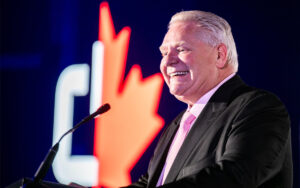
Are you an employer looking to throw a company party this holiday season? Read on. Photo credit: Pexels/Kampus Production
With the opening up of COVID-19 restrictions on social gatherings, many workplaces are looking forward to celebrating together the upcoming holiday season and the ability to socially gather like it was 1999. Putting aside caution about the increasing number of cases and the new strains that may impact on the planning of holiday parties, employers must remember the basics.
While holiday parties are a form of staff appreciation and can be a great way to boost employee morale, they are not without risk – particularly in relation to employer liability and vicarious liability for the conduct of their employees at the party and any after-party. If an employer is willing to take on these risks, particularly if they are not planning to hold a “dry” celebration, they can reduce if not substantially avoid potential employer liability by establishing clear expectations and “rules” so to speak for the holiday party. This article provides an overview first of the potential legal exposure to liability that employers face when throwing such parties, and then provides items to put on employers’ holiday party organization checklists.
Liability:
Generally, there is the legal principle of “vicarious liability”. Under this principle applicable for example in tort law as well as under the Ontario Human Rights Code (Code), an employer is liable for the actions of its employees at the “workplace” and in the “course of their employment”. If you serve alcohol at your company holiday parties the line between in the course of their employment and not gets blurred.
Additionally, under the OHSA’s general duty clause employers must provide a workplace free from recognized hazards in order to provide a healthy and safe workplace. A workplace free of hazards is important for keeping staff safe as well as protecting the organization as a whole. Again, serving alcohol at company functions knowing the potential misconduct that could occur could be interpreted as creating a known hazard, particularly where there are no limits on the alcohol consumption. This duty of care includes the duty to take proactive steps to safeguard an employee from harm as well as of supervision to ensure employees do not leave the premises impaired.
Together statues (e.g., OHSA and the Code) and case law applying these statues and the common law have clearly established that the “workplace” is not only the employer’s premises or locations where one or more employees are present as a condition of their employment, but also “places” connected to the workplace that are outside of the office and during non-working hours – including parties and other social events whether sponsored by the employer or not. This includes, for instance, employees on social media at home, employer sponsored parties, and employee orchestrated after-parties following a company sponsored event.
For illustration, under the case law the term “course of employment” has been expanded to include situations where employees are off-site and off-duty and get drunk (i.e., at a company sponsored event). Some in particular deal with the situation where employees continue on to a pub or some other after-party and then drink and drive. In one such case the employer was held partially liable for the employee’s injuries resulting from a drinking and driving car accident as the “host” of the party – even though the after party was not an employer sponsored function. This is because as hosts, employers have an obligation to ensure employees are safe; by introducing alcohol to employees at the employer-sponsored function they have started the events in motion.
Bottomline:
Employers must take sufficient precautions to ensure that their employees are returned home safely or they will be found to have failed their duty of care to their employees. This duty of care applies whether the event is held on or off work premises and even if the alcohol is served by someone else, such as a restaurant or a caterer.
Employers are liable for the actions of their employees at work-related events, even if they take place outside of the office and work hours.
Where an employee at any level of the organization fueled by alcohol served by the employer crosses the line of decency or appropriate conduct and engages in harassing, discriminatory, or violent behaviour, the employer could very well be found vicariously liable for those actions.
The Checklist:
Ensure you are providing your employees with a safe and harassment-free work environment during and on the way home from employer sponsored social gatherings. This may involve:
- Having a written policy that governs the use of alcohol at company events and ensure that the employees are familiar with the policy.
- Before the party reminding employees: (a) that the party is still a work-event, their behaviour reflects on their employer and themselves as an employee; (b) it is important to drink and act responsibly, including acting in line with the employers’ values, policies, and codes of conduct. Attach all relevant polices to the reminder and reinforce that misconduct will be subject to discipline; (c) not to drink and drive; and (d) not to pressure other employees to drink or tease those who don’t.
- Making attendance optional.
- Consider holding the party during the day and refrain from serving alcohol.
- If alcohol is served, consider forgoing hard liquor and limiting the offerings to beer and wine.
- Making non-alcoholic beverages and food available.
- Designating a responsible person to remain “in control” and intoxicant free for the entirety of the social function to monitor consumption and ensure any incidents of offside conduct is quickly and appropriately addressed or prevented.
- Having a reasonable, set number of drink tickets to avoid overconsumption (e.g., 2). Do not provide an open bar and ask that employees not provide their unused tickets to others.
- Prohibiting drinking games and contests.
- Ending the party at a designated time and close the bar an hour in advance.
- Providing safe transportation home (no driving; provide taxi chits or hotel bookings).
- Ensuring alcohol is served by licensed servers and have them monitor consumption (and if any overconsumption). They call it Smart Serve for a reason.
- Ensuring that those who have overconsumed are not a hazard to themselves or others. This may involve among other things taking steps to limit further consumption, reminding employees those who are about to drink and drive, taking away vehicle keys, and, if necessary, calling the police where intoxicated employees drive.
Ensure that if you receive a harassment or discrimination complaint at or after the party that you take it seriously and act on it. An employer’s liability may be compounded by a failure to appropriately respond to a complaint, including but not limited to protect the employee from further incidents and/or appropriately investigate a complaint. This could include:
- Ensuring that the complainant is safe, removing hazards or potential exposure to further or other incidents as well as putting in place appropriate precautions.
- Conducting an investigation appropriate to the circumstances.

Sheryl L. Johnson brings a proactive, creative, and vibrant attitude to her labour, employment and human resource law practice. Sheryl has extensive experience in representing clients in both the provincial and federal jurisdictions on all matters relating to employment and labour law, including for example construction labour law, employment related civil wrongful dismissal, human rights, and labour board litigation; privacy, governance, statutory and regulatory compliance, and executive compensation matters; as well as conducting workplace training and workplace investigations. Sheryl is also an avid educator and writer, including authoring a bi-weekly business column in The Niagara Independent and the text: Sexual Harassment in Canada: A Guide for Understanding and Prevention. Sheryl enjoys in her free time giving back to the Niagara community. She is a member of the WIN Council, Chair of the Board of Directors for the Niagara Jazz Festival, Vice-President of the Board of Directors for the YWCA Niagara Region, Secretary of Big Brothers Big Sisters of Niagara Falls Board of Directors, a board member of the Niagara Home Builders Association, and a board member of the Women in Construction group of the Niagara Construction Association.
You can connect with her on LinkedIn or contact her at sljohnson@sullivanmahoney.com.


















